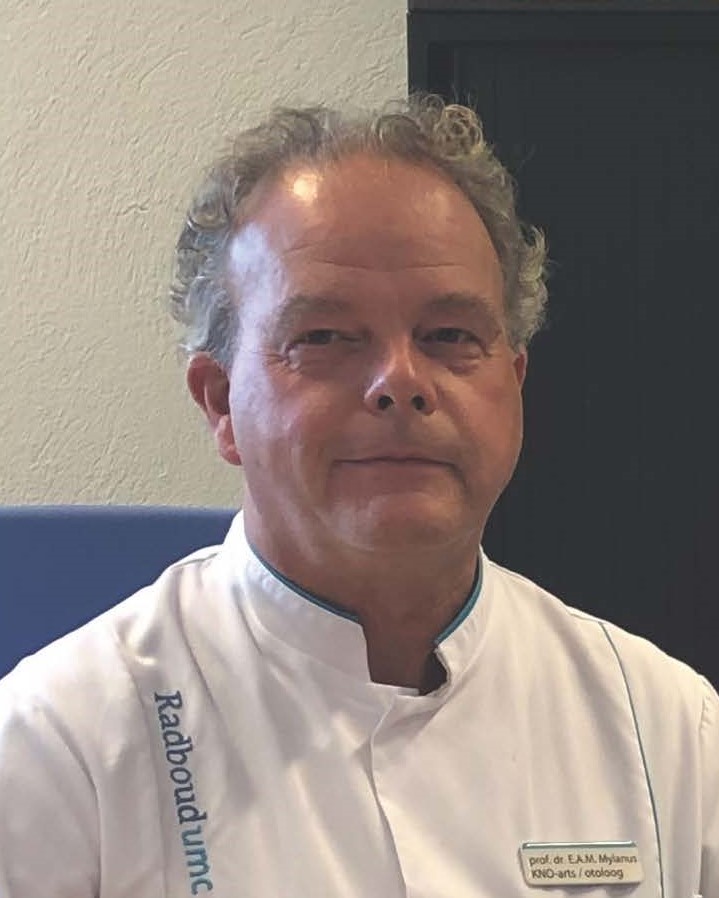We’re delighted to continue our latest news post series Meet the PIs by sharing an interview with one of the key supervisors in the MOSAICS network: Dr. Emmanuel Mylanus.
Based at Radboud University Medical Centre (Radboudumc), one of the two beneficiaries in the MOSAICS project, Emmanuel is one of the MOSAICS ESRs‘ main supervisors. Below he tells us about what fascinates him in hearing-related research, how he has experienced his role in MOSAICS so far, what he has learnt along the way and what advice he would give to an aspiring early-career researcher in his field.

It is striking to see that within the three decades that I have been involved in research on hearing loss rehabilitation so much has been achieved, and yet we are still scratching at the surface at what we envision to reach in the future.
Emmanuel Mylanus
What is an aspect of hearing-related research that still fascinates you today as it did when you first encountered it? The fact that hearing-related research is still so much on the move. It is striking to see that within the three decades that I have been involved in research on hearing loss rehabilitation so much has been achieved, and yet we are still scratching at the surface at what we envision to reach in the future.
Is this also what brought you into this field of science? If not, what was the driving factor for you? No, it wasn’t. My primary driving factor to work within this field of research has been the clinical observation of the enormous impact that hearing impairment has on patients’ abilities to communicate and relate to the people and the environment. Likewise, it is amazing what we may achieve by mitigating hearing loss with reconstructive surgery, conventional hearing aid fitting and implantable devices like cochlear implants.
What is your role in MOSAICS and what are your key responsibilities within the project? I have had the pleasure to co-create the MOSAICS project. As from the outstart of the project I have the role of Scientist-in-charge. Specifically, I am the responsible academic supervisor of all four ESRs of the MOSAICS project. Within the goal of training ESRs to be able to work in both an industrial as an academic space, I am responsible for the ESRs to finalize a doctorate thesis and acquire a doctoral degree at the Radboud University.
After MOSAICS, the ESRs will be comfortable working in both the industrial and academic world. It is our intention for them to be knowledgeable of the importance of good communication and collaboration between partners and for them to have experienced the benefits of a well-structured programme with a well-defined goal.
Are there any aspects of working within an MSCA EID that surprised you? An MSCA EID project brings people and their ideas together. I did not foresee the number of meetings with the ESRs, the members of the supervisory board and the partners of the project, which is demanding in terms of time and preparation, yet so inspiring and fruitful. This has added significant value to both beneficiaries, secondment supervisors as well as the ESRs.
What is your goal for your ESRs? What is it that you want them to take away from this experience as part of MOSAICS?
As explained earlier, after MOSAICS the ESRs will be comfortable working in both the industrial and academic world. It is our intention for them to be knowledgeable of the importance of good communication and collaboration between partners and for them to have experienced the benefits of a well-structured programme with a well-defined goal. If the ESRs succeed to obtain a doctorate, in this process this would be a true bonus. A common denominator of the work we have performed throughout the project is our endeavor to improve outcomes of cochlear implantation in a broad sense. While working with patients, the ESRs have experienced what the daily impact of hearing impairment is, as well as what they may contribute in mitigating its negative effects.
What is the biggest challenge you face as a supervisor, and what has it taught you?
As a result of the way the MOSAICS project is structured, with an equal presence of the ESRs at both beneficiaries and secondments at partners’ institutes mostly abroad, it is a challenge for a supervisor to always be on top of things. At times therefore, one relies upon digital communication, or reports and observations out of second hand to assess whether the ESR is progressing according to plan, and in general is doing well as a person. The coherence of the group of supervisors, keeping each other well informed, is therefore paramount.
If you could give one key piece of advice to an aspiring early-career researcher in your field, what would that be? Make sure you know what your goal is and acknowledge the fact that the road to it may be long and winding.
If you could collaborate with any other field of science, which would interest you the most? Cognitive neuroscience.
We warmly thank Emmanuel for sharing his thoughts in this interview and for being a great role model for aspiring researchers and clinicians. Stay tuned for the next piece in the series!
